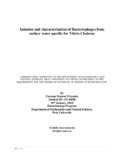Isolation and characterization of Bacteriophages from surface water specific for Vibrio Cholerae

View/Open
Date
2020-01Publisher
Brac UniversityAuthor
Priyanka, Farzana MansurMetadata
Show full item recordAbstract
The severe diarrheal disease cholera is caused by the bacterium Vibrio cholera. Toxigenic Vibrio cholerae strains belonging to O1 and O139 serogroups are the causative agents of epidemic and pandemic cholera. The Vibrio bacterium interacts with numerous phages in the aquatic ecosystem and in the intestine of cholera patients. Generally, two peaks of cholera outbreak are observed to coincide within the dry summer and monsoon rain. Cholera epidemic is a major public health concern. Several factors control the seasonal epidemics. Bacteriophages are one of the vital triggers which have been reported to collapse the outbreaks. Hence, the predatory nature of bacteriophage has a huge impact on the population for their corresponding hosts. This study was designed to isolate Vibrio cholera specific bacteriophages from environmental samples. The isolated bacteriophages were categorized not only according to their physiological characteristics (Host Range, pH stability, temperature stability and organic solvent sensitivity) but also on a molecular level using techniques like RFLP and PCR.
